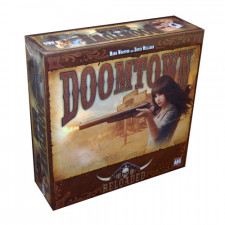Doomtown: Reloaded Review
on Nov 12, 2015
In days of yore, a forgotten time known as the nineties, it seemed that every intellectual property was coming out with a collectible card game. Few survived. Some of those defunct titles were novel, interesting, and fun. Like Doomtown. Well, AEG has resurrected the game, set in the Weird West of the Deadlands RPG, and re-implemented it not as a collectible card game, but as an expandable card game.
The collectible card game model is something that many gamers avoid. Random packs, rarity, and the constant expense of collecting just the right cards are huge turnoffs no matter how good the game. Doomtown: Reloaded, though, eliminates that model. Instead, while the base game provides everything you need to play, it can be expanded with “saddlebag†expansion packs. Each named pack is identical so you know exactly what cards you will receive.
But even if the distribution model is better, is the game any good? I think it is. The base game comes with four factions. Players can choose any cards from that faction as well as neutral cards. Lawdogs represent the sheriff; Sloane’s Gang is all about violence; the Morgan Cattle Company invests in inventions; and the Fourth Ring uses huckster hexes and other weird tricks.
Each player starts with their home base in the town. Players also start with several characters (termed “dudesâ€) of their choosing out at the beginning of play. This ensures that you will have options from the very beginning of the game. And you don’t have to worry as much about a poor draw. You’ll never start a game defenseless.
Players can also equip their dudes with guns, inventions, or other items providing various effects. And they can build more shops, banks, and other properties on their side of town. Somewhat unique, Doomtown: Reloaded has a definite feeling of spatial relationships and locations. When dudes are played, they start at the home property. But they can then move to adjacent properties or, crucially, into the Town Square. The Town Square is a special spot which is considered adjacent to every other property in the town. If enough of your dudes move to an opponent’s property, you get to control it – including any special or activated abilities it has.
Each dude can provide influence and each property can provide control. A player wins when he has more control than his opponent has influence. The most successful strategies, then, are those that enhance your own control (or steal it from opponents) while eliminating the opponent’s influential dudes.
And then there are the shootouts. If one dude calls out another, the player that got called out has only two choices. He can either return his home, running with his tail between his legs. Or he can answer the call and fight. If a fight occurs, both players can marshal up a posse among their available dudes and then both draw a random five cards from the top of the deck. Every single card has a suit and value just as in a standard poker deck. The player who can make the best poker hand wins – and the disparity in value dictates how many of the opposing dudes are killed or wounded.
The poker draw nature of shootouts elevates the deck construction of Doomtown: Reloaded to a completely different level. Not only do you want to make sure you put in cards that combo well together; not only do you want the proper distribution of properties, dudes, and weapons; but you also need to ensure you have the right card values to give you the maximum chance for a good poker draw.
In constructed deck building, half the fun is in planning out and testing novel decks. Doomtown provides so many nobs to turn that an engaged player can easily spend hours tweaking, theorizing, and constructing his perfect deck.
Some decks will focus on a particular suit or face cards, while others will concentrate on particular numbers to give the best chance of drawing pairs, triples, and four (or five) of a kind. The best Doomtown: Reloaded decks have a ton of thought put into them from every angle.
Doomtown is fairly easy to learn and play. But some of the best aspects are also its greatest weaknesses. For example, a novice player might simply rush his whole posse to the Town Square and call for a duel. A big first turn duel is possible and, if accepted, can result in a massive battle that either outright eliminates one player or effectively does so when they cannot come back from the loss. This might make Doomtown: Reloaded appear random or arbitrary. In truth, it is only with experience that players understand that such an early conflict isn’t worth it. Typically, the big fights start just a little later, after a player has played a few cards, thinned their deck, and has a better idea about what will be drawn in a duel.
Aside from this glitch- which will undoubtedly disappoint new players until they get the hang of it- Doomtown: Reloaded is mostly a good game. The sense of place and purpose permeates the experience. You get a feel for this old western town. But more than a mere spaghetti western, the Weird West of the Deadlands setting finds worthy representation. Hucksters get special access to hexes. Mad scientists build mechanical horses. And the main currency of the game is ghost rock.
Doomtown: Reloaded does more than any other card game to immerse you in the Weird West. Hardcore gamers will enjoy the complicated planning and decisions to be made both during deck construction and at the tournament. But competence, let alone mastery of this title, doesn’t come easy. It requires dedicated players willing to explore a deep decision space and avoid the eagerness of a novice to jump into a fight.

 Customer Support
Customer Support  Subscribe
Subscribe 




 Account
Account  Wishlist
Wishlist 

